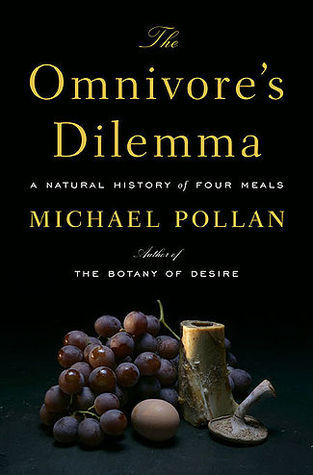
“What should we have for dinner? For omnivore like ourselves, this simple question has always posed a dilemma. When you can eat just about anything nature (or the supermarket) has to offer, deciding what you should eat will inevitably stir anxiety, especially when some of the foods on offer might shorten your life. Today, buffered by one food fad after another, America is suffering from what can only be described as a national eating disorder. The omnivore’s dilemma has returned with a vengeance, as the cornucopia of the modern American supermarket and fast-food outlet confronts us with a bewildering and treacherous food landscape. What’s at stake in our eating choices is not only our own and our children’s health, but the health of the environment that sustains life on earth.
The Omnivore’s Dilemma is groundbreaking book, in which one of America’s most fascinating, original, and elegant writers turns his own omnivorous mind to the seemingly straightforward question of what we should have for dinner. The question has confronted us since man discovered fire, but according to Michael Pollan, the bestselling author of The Botany of Desire, how we answer it today, at the dawn of the twenty-first century, may well determine our very survival as a species. Should we eat a fast-food hamburger? Something organic? Or perhaps something we hunt, gather, or grow ourselves?
To find out, Pollan follows each of the food chains that sustain us—industrial food, organic or alternative food, and food we forage ourselves—from the source to a final meal, and in the process develops a definitive account of the American way of eating. His absorbing narrative takes us from Iowa cornfields to food-science laboratories, from feedlots and fast-food restaurants to organic farms and hunting grounds, always emphasizing our dynamic coevolutionary relationship with the handful of plant and animal species we depend on. Each time Pollan sits down to a meal, he deploys his unique blend of personal and investigative journalism to trace the origins of everything consumed, revealing what we unwittingly ingest and explaining how our taste for particular foods and flavors reflects our evolutionary inheritance.
The surprising answers Pollan offers to the simple question posed by this book have profound political, economic, psychological, and even moral implications for all of us. Ultimately, this is a book as much about visionary solutions as it is about problems, and Pollan contends that, when it comes to food, doing the right thing often turns out to be the tastiest thing an eater can do. Beautifully written and thrillingly argued, The Omnivore’s Dilemma promises to change the way we think about the politics and pleasure of eating. For anyone who reads it, dinner will never again look, or taste, quite the same.” — Book promo @ goodreads.com
Carbon is the most common element in our bodies—indeed, in all living things on earth. We earthlings are, as they say, a carbon life form. (As one scientist put it, carbon supplies life’s quantity, since it is the main structural element in living matter, while much scarcer nitrogen supplies its quality—but more on that later.) Originally, the atoms of carbon from which we’re made were floating in the air, part of a carbon dioxide molecule. The only way to recruit these carbon atoms for the molecules necessary to support life—the carbohydrates, amino acids, proteins, and lipids—is by means of photosynthesis. Using sunlight as a catalyst the green cells of plants combine carbon atoms taken from the air with water and elements drawn from the soil to form the simple organic compounds that stand at the base of every food chain.
The longer the ingredient label on a food, the more fractions of corn and soybeans you will find in it. They supply the essential building blocks, and from those two plants (plus a handful of synthetic additives) a food scientist can construct just about any processed food he or she can dream up.

We had some more winter during the night Saturday/Sunday with 0.11″ of rain during those dark hours. Also very strong cold winds, 15-20 mph with over 30 mph gusts, so Erik and I did only a morning half walk (that’s half our usual distance). Then skipped the mid day walk because of the continuing winds and what looked like more rain to come.
The forecast was for a repeat today with increasing winds, chance of rain and high temperatures for both days in the lower to mid 50s. So far we only got 0.02″ of rain and no strong winds this morning but I expect them before the day is done. The high yesterday was 57°F and it looks like it could be warmer today.

[A] great many of them [people] are prepared to take matters into their own hands. As Napoleon Bonaparte is supposed to have said, wars happen when the government tells you who the enemy is; revolutions happen when you figure it out for yourselves. Quite a few people in the United States have figured things out for themselves, and many of them seem quite willing to use Donald Trump’s monumental ego as a battering ram to knock some sense into a system that’s given them nothing but misery for too many decades. If that fails, in turn, they’ll simply reach for some other instrument, and it’s worth keeping in mind that their next choice may be even less welcome to Harari and his rich friends. — The Laughter of Wolves by John Michael Greer